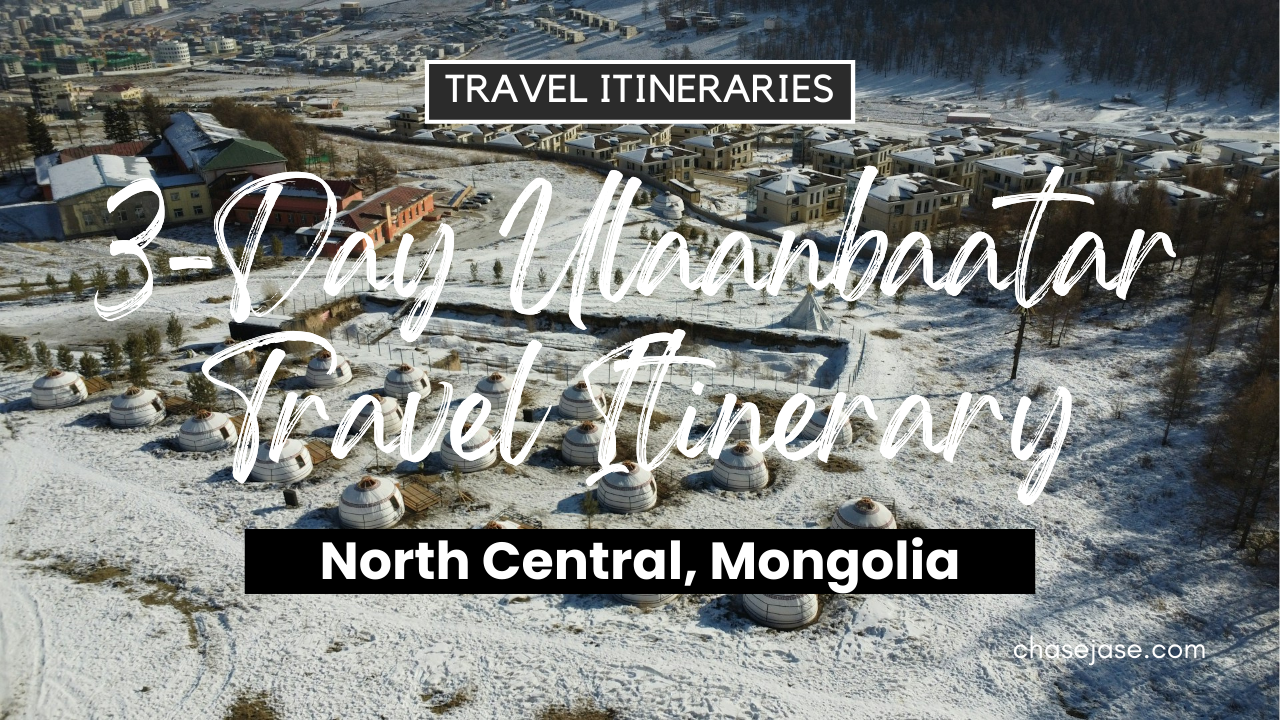3-Day Ulaanbaatar, Mongolia Travel Itinerary

Introduction:
Ulaanbaatar is the capital and largest city of Mongolia. It sits in the north-central part of the country along the Tuul River and at the foothills of the Bogd Khan Mountain. Ulaanbaatar is known for being a fascinating mix of nomadic traditions and Soviet-style infrastructure. The city is the cultural, economic, and political hub of Mongolia and serves as a gateway to its vast steppes, monasteries, and national parks. This 3-day itinerary is designed to help travelers explore the most significant attractions in and around Ulaanbaatar while experiencing its authentic Mongolian spirit.
Places to Visit:
- Gandantegchenling Monastery: This is the most important active Buddhist monastery in Mongolia, featuring a 26-meter-tall statue of Avalokiteśvara.
- Sukhbaatar Square: This is the central square in Ulaanbaatar named after revolutionary hero Damdin Sukhbaatar. It is surrounded by important government buildings and the National History Museum.
- The National History Museum of Mongolia: This museum is essential for learning about Mongolia’s prehistory, the empire era, and modern times.
- Zaisan Memorial: This Soviet-era monument honors fallen soldiers and offers panoramic views of the city from the top of the hill.
- Bogd Khaan Palace Museum: This site preserves the winter palace of Mongolia’s last king and spiritual leader, the Bogd Khan.
- Genghis Khan (Chinggis Khaan) Statue Complex: This massive 40-meter-high statue is located 54 kilometers east of the city and stands as the largest equestrian statue in the world.
- Gorkhi-Terelj National Park: Located about 70 kilometers from Ulaanbaatar, this park is known for its alpine scenery, rock formations, and outdoor activities.
- Choijin Lama Temple Museum: This preserved Buddhist temple complex is rich with statues, religious masks, and ancient architecture.
- Central Museum of Mongolian Dinosaurs: This museum showcases Mongolia’s dinosaur discoveries, including a nearly complete skeleton of a Tarbosaurus.
- Narantuul Market (Black Market): This is the largest open-air market in Ulaanbaatar and offers everything from traditional Mongolian clothing to antiques.

Sample Itinerary:
Day 1: City History and Cultural Landmarks
- 9:00 AM – Begin at Sukhbaatar Square: Observe the statue of Damdin Sukhbaatar and the seated statue of Genghis Khan at the Government Palace (45 minutes).
- 9:45 AM – Visit the National Museum of Mongolia (5-minute walk): Explore exhibits on Mongolian history, from prehistoric times to the modern era (1.5 hours).
- 11:30 AM – Head to Gandan Monastery (10-minute taxi): Watch monks in prayer and view the giant Avalokiteśvara statue (1 hour).
- 1:00 PM – Lunch at a traditional Mongolian restaurant.
- 2:30 PM – Visit the Choijin Lama Temple Museum (15-minute taxi): Discover Buddhist art and preserved temple structures (1 hour).
- 4:00 PM – Climb Zaisan Memorial (20-minute taxi): Take in panoramic views of the city and learn about the Soviet-Mongolian alliance (1 hour).
- 5:30 PM – Optional visit to Buddha Garden or dinner in the Zaisan area.
Day 2: Nature and Nomadic Heritage
- 8:30 AM – Depart for Genghis Khan Equestrian Statue Complex (1.5-hour drive): Tour the statue, museum, and surrounding steppe (2 hours).
- 12:00 PM – Continue to Terelj National Park (1-hour drive): Visit Turtle Rock, hike to Ariyabal Meditation Temple, and enjoy nature (3 hours).
- 4:00 PM – Horseback riding or camel rides at a nearby nomadic camp (1 hour).
- 5:30 PM – Dinner at a ger (traditional yurt) lodge or restaurant inside the park.
- 6:30 PM – Return to Ulaanbaatar (1.5-hour drive).

Day 3: Museums and Markets
- 9:30 AM – Visit the Bogd Khan Palace Museum: Explore the preserved winter palace and learn about Mongolia’s last monarch (1 hour).
- 11:00 AM – Walk to the Central Museum of Mongolian Dinosaurs (15-minute drive): Examine world-famous fossils and paleontology exhibits (1 hour).
- 12:30 PM – Lunch at a downtown cafe or international restaurant.
- 2:00 PM – Explore the Naran Tuul Market (20-minute taxi): Shop for deel (traditional dress), Mongolian boots, and souvenirs (1.5 hours).
- 4:00 PM – Optional shopping at State Department Store or relax at a local coffee shop.
- 6:00 PM – Farewell dinner with Mongolian barbecue and live traditional music.
See Itinerary Map (Includes Places to Visit and Accommodations)
Best Time To Go:
The best time to visit Ulaanbaatar is from June to September. These months represent the Mongolian summer, when temperatures range between 15°C to 25°C (59°F to 77°F). During this time, the countryside is lush, festivals like Naadam occur in July, and access to national parks and nomadic experiences is optimal. Winter, from November to March, is extremely cold with temperatures often falling below −20°C (−4°F), making outdoor exploration difficult. Spring and fall can be pleasant but unpredictable in weather.
Activities To Do:
- Attend a Naadam Festival (July): This national festival showcases Mongolia’s “Three Manly Sports”—wrestling, horse racing, and archery.
- Ride a horse in Terelj National Park: Mongolia is known as the land of the horse, and riding through open steppe is a quintessential experience.
- Watch a traditional throat singing performance: Throat singing is a unique form of Mongolian music performed in cultural venues or restaurants.
- Stay overnight in a ger (yurt): Many ger camps offer stays near Ulaanbaatar, where visitors can learn about nomadic customs.
- Try Mongolian cuisine: Dishes like buuz (steamed dumplings), khuushuur (fried meat pies), and airag (fermented mare’s milk) offer local flavor.

Accommodations:
- Shangri-La Hotel Ulaanbaatar: This 5-star hotel offers luxury amenities, a central location, and views of the city skyline.

- Best Western Premier Tuushin Hotel: Located near Sukhbaatar Square, this hotel includes a spa, fine dining, and excellent service.

- The Blue Sky Hotel & Tower: A modern skyscraper hotel with panoramic city views, stylish rooms, and a prime location.

- Kempinski Hotel Khan Palace: Offers spacious rooms, business services, and is located in a quieter part of the city.

- Bayangol Hotel: One of Ulaanbaatar’s oldest hotels, offering reliable mid-range accommodations and Mongolian dining options.

- Zaya Hostel: This hostel offers clean, friendly, and centrally located lodging with private and shared rooms.

- Golden Gobi Guesthouse: A popular choice for backpackers offering basic facilities, free city maps, and travel support.
Transportation Options:
- Taxis: Taxis are available in Ulaanbaatar, but most do not use meters. Pre-arranged rides through hotels or apps are more reliable.
- Public Buses: City buses are affordable and connect major parts of the city, but routes and signs are often only in Mongolian.
- Rideshare Apps: Apps like UB Cab or InDriver are increasingly used for convenient and cost-transparent transport.
- Car Rental: Car rental with or without a driver is available through local agencies and hotels, especially for day trips to Terelj or the Genghis Khan statue.
- Walking: The downtown area is pedestrian-friendly, especially around Sukhbaatar Square.
- Tour Operators: Many travelers book full-day or multi-day tours that include transport, which is especially useful for rural areas and national parks.
Tips:
- Carry small cash in Mongolian Tugrik (MNT): Many places do not accept cards, especially in markets and rural areas.
- Dress in layers: Ulaanbaatar’s weather can change rapidly, even in summer. A jacket, hat, and sunscreen are essential.
- Use a VPN for the internet: Internet access can be slow, and some websites may be restricted. A VPN can provide better access.
- Respect nomadic customs: Always ask before entering a ger, and accept food or drink offerings with both hands.
- Avoid tap water: Stick to bottled or filtered water to avoid digestive issues.
Ulaanbaatar is a fascinating city where nomadic heritage meets urban development. This 3-day itinerary provides a well-balanced mix of historical, cultural, and natural experiences. From exploring ancient temples and museums to taking in the sweeping views of the Mongolian steppe, Ulaanbaatar offers something truly unique. Visitors will leave with a deeper understanding of Mongolia’s past, its vibrant present, and its enduring traditions. This guide ensures that your trip is smooth, meaningful, and full of discovery.



